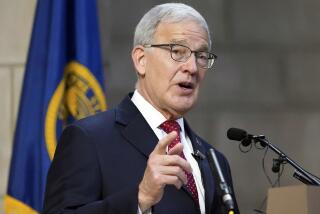Felons must pay up to vote in Washington state
- Share via
SEATTLE — Felons who serve their full prison terms must pay their court-ordered fines before regaining the right to vote, a divided state Supreme Court ruled Thursday in a case watched by voting rights advocates.
Three ex-convicts claimed Washington’s felon-voting restrictions unconstitutionally denied voting rights based on a person’s wealth, and a King County court had agreed.
But in a 6-3 decision, the Supreme Court said the law did not illegally discriminate against poor felons who had trouble paying their legal bills. Justices also rejected the defendants’ analogy to illegal poll taxes, saying the felons gave up their constitutionally protected right to vote when they committed crimes.
The state American Civil Liberties Union, which sued on behalf of the plaintiffs, estimated last year that more than 250,000 released felons were unable to vote.
It’s not clear how many felons are barred from voting because of unpaid fines. Figures from 2002 showed that more than 46,000 people were subject to the rule.
The law doesn’t violate the state constitution’s fair-treatment laws because the policy applies to all felons regardless of their crimes, the high court said.
Even though a poor felon is affected more harshly than an ex-convict with money, that’s not enough to violate the Constitution’s equal protection clause, Justice Mary E. Fairhurst wrote for the majority.
The court’s minority said the policy was unconstitutional because it allowed felons to complete their sentences faster -- and get their voting rights back sooner -- if they had money.
State Atty. Gen. Rob McKenna and Secretary of State Sam Reed applauded the ruling.
“It is the Legislature’s place, not the court’s, to decide whether or not to change state law,” said Reed, the state’s top election official.
More to Read
Get the L.A. Times Politics newsletter
Deeply reported insights into legislation, politics and policy from Sacramento, Washington and beyond. In your inbox twice per week.
You may occasionally receive promotional content from the Los Angeles Times.










